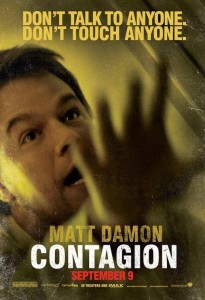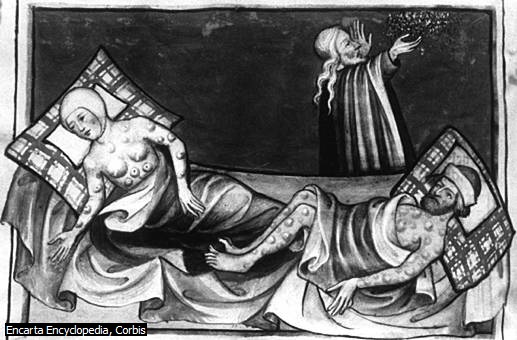Death in the Age of Encounter My wife is quite excited, because the Matt Damon and Kate Winslet film Contagion is about to come to our local Red Box. She loves a good mystery, especially one that involves mass epidemics. It seems that every few years we recycle the idea of a massive outbreak (think Outbreak, for instance). Perhaps outbreaks frighten us because they have happened so devastatingly in the past and, we fear, could happen again. It’s only fitting, too, that this post follows Kevin’s on Jonathan Edwards … who, sadly, died after taking a smallpox inoculation as part of an effort to convince others that inoculations would prevent future outbreaks.
My wife is quite excited, because the Matt Damon and Kate Winslet film Contagion is about to come to our local Red Box. She loves a good mystery, especially one that involves mass epidemics. It seems that every few years we recycle the idea of a massive outbreak (think Outbreak, for instance). Perhaps outbreaks frighten us because they have happened so devastatingly in the past and, we fear, could happen again. It’s only fitting, too, that this post follows Kevin’s on Jonathan Edwards … who, sadly, died after taking a smallpox inoculation as part of an effort to convince others that inoculations would prevent future outbreaks.
On Monday, we’re going to have our first discussion on the colonial era. We will start with contagion. What would you do if an outbreak began and around you people were dying? Would you run away? Would you pray to God, blame God, or change faiths? Would you abandon family? Would you hide? What would you do?
The conversation will, hopefully, startle them into imagining the world Europeans inhabited in the fourteenth century and then Native Americans did in North and South America after 1492. The Black Death and then the smallpox ravaging that took place had drastic impacts in Europe and in the Americas. I’m not sure what my students will say about it, but we’ll find out on Monday.
 |
| Europeans knew plagues too – Bubonic plague |
Some other elements for discussion (and, here is the wink, wink … nod, nod about our quiz) will be the main arguments from James Merrell and Neal Salisbury, the Iroquois creation myth, the Portuguese battling along the coast of West Africa, the various ways Native Americans used the land, and the first British colonies. As we think about whether this was an era best defined by conquest or contact, it strikes me that one thing everyone shared was death. It leads me to wonder about Drew Faust’s This Republic of Suffering, in which she claims that the American Civil War inaugurated a new era of thinking about massive death. It seems that those who lived in the first hundred and fifty years of European-Native American interaction knew epidemic and epidemic death of another profound sort.



I am tracking with you. The contact between Europeans and Indians resulted in a biological disaster of proportions never seen in the history of the world. The Civil War was wholly a man-made disaster. That may be the difference that changes how people perceived death. Pestilence or the sword.
so knowledge of death – where it came from, who is responsible – is important? During the Civil War, hardly anyone challenged God’s existence … even Lincoln famously accepted that God’s will was God’s will. In the enchanted world of the colonies, I wonder how unexplainable death influenced faith. … it’s so hard to get down to that level because the source material is so tough (Europeans “recording” what Native Americans tell them … such as Columbus claiming the locals would give him anything he asked for or William Wood describing Indian Responses to English, 1634, where the native women complain because English men treat their wives so much better.
All fun stuff for discussion!
I don’t know if people in the past saw a difference between death by the sword or death by pestilence. It just seems that the sword is much more intentionally personal. I think maybe by examining death accounts in diaries and journals ( comparing different periods) we could get a sense of how people responded to different circumstances of death and dying. In a world where death is so visible and constant, I do wonder if the the explanations were always as simple as this is God’s will with no additional reflection or attempt to make sense of it. Thinking about death has a history worth exploring. In any case it does get us off the scope of a survey class, but still an interesting topic.